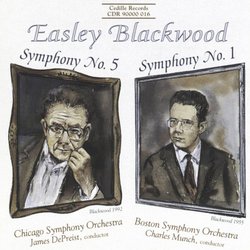Album Description The first orchestral recording that Cedille produced, this CD makes musical history on two counts by offering the premiere recording of American composer Easley Blackwood's sumptuous new Fifth Symphony and the first-ever reissue of the landmark recording of his celebrated and strikingly original First Symphony. Blackwood's Symphony No. 1, Op. 3, was recorded by Charles Munch and the Boston Symphony Orchestra for RCA Victor in 1958 and released in 1959. Long out of print, the "Living Stereo" LP has become a prized collectors item. Cedille's reissue was digitally remastered from RCA's original stereo master tape, now part of BMG Classics' archives. The First Symphony's premiere performances brought Blackwood praise as "a stoutly original musical thinker" (Time, November 24, 1958). Howard Taubman of The New York Times called him "a composer of uncommon gifts." High Fidelity reviewer Alfred Frankenstein (February 1960) wrote of being captivated by "its freshness, its vitality, its dramatic, epical qualities, and the sense of a lively, original, uncompromising talent at work." Eric Salzman, reviewing the recording for The New York Times (Jan 31, 1960), called the work a "wild, grandiose and eclectic work full of almost Lisztian gestures . . . this young composer wants his symphony to embrace and reconcile a whole world of varying musical materials." Blackwood's Symphony No. 5, Op. 34, also reflects this abiding interest in a wide variety of musical styles, as well as Blackwood's latter-day interest in tonal music and older harmonic idioms. Around the time Blackwood sat down to write the Fifth Symphony, he had become enamored of piano works by lesser-known modernists of the early 1900s. "I originally conceived the work as the kind of symphony Sibelius might have written had he experimented with the modernist techniques that attracted composers like Casella and Szymanowski," Blackwood writes in the CD booklet. The Fifth Symphony, completed in 1990, was commissioned by the Chicago Symphony Orchestra to celebrate its centennial. Cedille's recording is derived from the 1992 premiere concerts given by the CSO and conductor James DePreist. Chicago Sun-Times critic Wynne Delacoma (May 22, 1992) heard "fingerprints of Sibelius and other late-Romantic era composers" in the symphony's "spacious sweep and serene, unhurried melodies with hints of pastoral or folk elements." Delacoma called the symphony "a well-crafted, graceful work" that achieved Blackwood's twin goals of writing a work that orchestras enjoy playing and audiences enjoy hearing.


 Track Listings (7) - Disc #1
Track Listings (7) - Disc #1